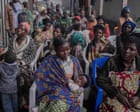
In recent days, several significant developments have captured public attention worldwide, each highlighting crucial areas of social responsibility and empathy. From the United Kingdom’s decision to reduce its overseas aid budget, to calls for the closure of a controversial immigrant detention facility in Florida, and concerns over body image in the fashion industry, these issues call for thoughtful reflection on global challenges. Here’s a calm and comprehensive look at these topics and their broader implications.
The United Kingdom’s reduction of its aid budget to 0.3% of national income has surfaced fresh discussions about the balancing act between domestic priorities and international responsibilities. Labour’s decision has been met with concern, particularly as an impact assessment by the Foreign, Commonwealth & Development Office highlights potential adverse effects. Notably, it suggests that these cuts could significantly impact children’s education and health services in developing African countries, which have long relied on this support to enhance educational access and health outcomes. As the world continues to face varying degrees of socio-economic challenges, the conversation around aid highlights the need for developed nations to consider both the immediate and long-term implications of their financial commitments on global education and healthcare systems.
Meanwhile, across the Atlantic, the conditions at the “Alligator Alcatraz” immigrant detention facility in Florida have stirred a compassionate response from non-profit organizations and medical professionals. These advocates are making heartfelt appeals for the closure of this controversial facility. Situated in the remote Everglades, the facility has been likened to a camp prone to flooding, housing over 1,000 men in uncomfortable conditions. Reports of inadequate medical care and unhygienic living environments, described as resembling “cages flooded with feces,” emphasize the urgency in addressing humanitarian standards. The Mexican government has also shown concern, particularly with the detention of 14 of its citizens. As global migration continues to challenge infrastructures, these human-centric narratives underscore the need for compassion and humane policy responses.
In a different realm, yet equally relevant to societal well-being, is the focus on body image representation in the fashion industry. Marks & Spencer, a high-profile retailer, recently faced scrutiny when its advertisement featuring a model deemed “unhealthily thin” was banned by the Advertising Standards Authority (ASA). The ruling addressed fears that the fashion industry might be regressing on progress made in body positivity. The ASA’s decision, reflecting on the portrayal of unrealistic body images, serves as a reminder of the cultural responsibility that media holds in promoting healthy and inclusive body representations. These actions highlight an ongoing societal commitment to nurturing self-esteem and inclusivity in public spheres.
As these diverse stories illustrate, the journey toward addressing global challenges is ongoing and necessitates both thoughtful governance and societal participation. Each situation, from international aid to humane treatment of migrants, and supportive representations in media, invites communities and leaders alike to reflect on how collective actions today can positively influence our shared future. Through empathetic engagement and a commitment to fostering understanding, these challenges can be approached in a manner that encourages solidarity, respect, and a concerted effort to uplift all facets of society.
In closing, it is important to engage with these issues calmly and with an open heart, fostering environments where constructive dialogue leads to actionable solutions that respect and elevate global human dignity. This perspective not only enriches our local communities but also connects us more deeply with the broader human experience around the globe.
Source: {link}
